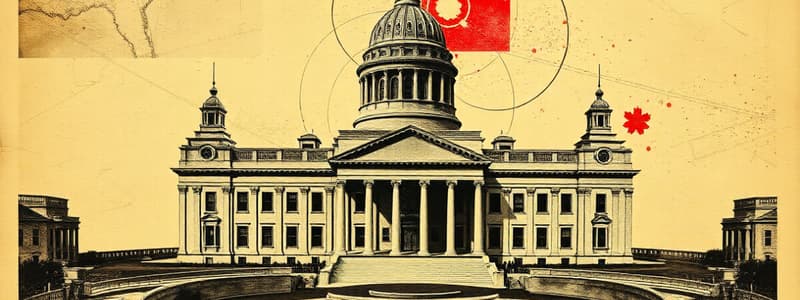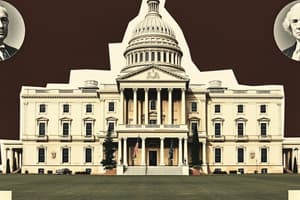Podcast
Questions and Answers
What is the term length for a senator in the US Senate?
What is the term length for a senator in the US Senate?
- 6 years (correct)
- 4 years
- 8 years
- 2 years
How many total senators does the US Senate have?
How many total senators does the US Senate have?
- 150
- 200
- 50
- 100 (correct)
What was the 3/5 compromise primarily concerned with?
What was the 3/5 compromise primarily concerned with?
- Determining the voting age
- Counting enslaved individuals for representation (correct)
- Dividing electoral votes
- Establishing state boundaries
What fraction of the Senate is elected every 2 years?
What fraction of the Senate is elected every 2 years?
How did the 3/5 compromise affect southern states?
How did the 3/5 compromise affect southern states?
What is the minimum number of votes required for an amendment to pass in state legislatures?
What is the minimum number of votes required for an amendment to pass in state legislatures?
How many senators are elected from each state?
How many senators are elected from each state?
Which amendment changed the method of electing senators to being directly elected by the people of the states?
Which amendment changed the method of electing senators to being directly elected by the people of the states?
What is the total number of representatives in the House?
What is the total number of representatives in the House?
Who makes the choice to refer a bill to standing committees in the House of Representatives?
Who makes the choice to refer a bill to standing committees in the House of Representatives?
What fraction of the states is required to ratify a proposed amendment?
What fraction of the states is required to ratify a proposed amendment?
What characterizes standing committees?
What characterizes standing committees?
How many standing committees does the Senate currently have?
How many standing committees does the Senate currently have?
What was the original manner of electing senators before the 17th Amendment?
What was the original manner of electing senators before the 17th Amendment?
How often are representatives in the House elected?
How often are representatives in the House elected?
What is the primary role of majority and minority leaders in the Senate regarding bills?
What is the primary role of majority and minority leaders in the Senate regarding bills?
What does the 10th Amendment emphasize regarding power distribution?
What does the 10th Amendment emphasize regarding power distribution?
What influences committee decisions apart from party caucuses?
What influences committee decisions apart from party caucuses?
What is a caucus in the context of the legislative process?
What is a caucus in the context of the legislative process?
Which committee would a bill related to education most likely be referred to in the House?
Which committee would a bill related to education most likely be referred to in the House?
What might executive agencies do in regards to bills being considered by Congress?
What might executive agencies do in regards to bills being considered by Congress?
What can a new president do regarding the executive orders of their predecessor?
What can a new president do regarding the executive orders of their predecessor?
Under what condition can courts overturn an executive order?
Under what condition can courts overturn an executive order?
What did Biden's executive order regarding student debt entail?
What did Biden's executive order regarding student debt entail?
What can Congress do if they want to override a president's executive order?
What can Congress do if they want to override a president's executive order?
What is a significant recent example of an executive order being overturned?
What is a significant recent example of an executive order being overturned?
What factors influence a president's nominations for federal judges?
What factors influence a president's nominations for federal judges?
What is required for a Congress-passed bill to remain in effect against a president's executive order?
What is required for a Congress-passed bill to remain in effect against a president's executive order?
What is one of the powers held by the president besides issuing executive orders?
What is one of the powers held by the president besides issuing executive orders?
What is a regular veto?
What is a regular veto?
How can Congress override a presidential veto?
How can Congress override a presidential veto?
What characterizes a pocket veto?
What characterizes a pocket veto?
What is a line item veto?
What is a line item veto?
What are veto threats typically used for?
What are veto threats typically used for?
What are executive orders?
What are executive orders?
What must occur for the Senate to approve an executive branch appointment?
What must occur for the Senate to approve an executive branch appointment?
Which types of nominations require Senate approval?
Which types of nominations require Senate approval?
What makes it difficult to override a presidential veto?
What makes it difficult to override a presidential veto?
What does the term 'going public' refer to in the context of executive action?
What does the term 'going public' refer to in the context of executive action?
What type of criminal offenses can a president grant pardons for?
What type of criminal offenses can a president grant pardons for?
What powers does the president have during a declared national emergency?
What powers does the president have during a declared national emergency?
What is required for a treaty negotiated by the president to become legally binding?
What is required for a treaty negotiated by the president to become legally binding?
Which of the following accurately describes the power of the president as commander in chief?
Which of the following accurately describes the power of the president as commander in chief?
What is judicial federalism characterized by?
What is judicial federalism characterized by?
Flashcards
US Senate
US Senate
The upper chamber of the US Congress, with 100 members (two from each state).
Equal Representation in the Senate
Equal Representation in the Senate
The rule that each state has two senators regardless of its population, ensuring equal representation for smaller states.
Vice President's Tie-breaking Role
Vice President's Tie-breaking Role
When a vote in the Senate is tied, the Vice President of the United States casts the deciding vote.
3/5 Compromise
3/5 Compromise
Signup and view all the flashcards
Impact of the 3/5 Compromise
Impact of the 3/5 Compromise
Signup and view all the flashcards
Caucus
Caucus
Signup and view all the flashcards
Standing Committee
Standing Committee
Signup and view all the flashcards
Bill Referral
Bill Referral
Signup and view all the flashcards
Speaker of the House
Speaker of the House
Signup and view all the flashcards
Lobbyists
Lobbyists
Signup and view all the flashcards
Committee Power
Committee Power
Signup and view all the flashcards
Floor Debate
Floor Debate
Signup and view all the flashcards
Between Chamber Negotiations
Between Chamber Negotiations
Signup and view all the flashcards
Regular Veto
Regular Veto
Signup and view all the flashcards
Pocket Veto
Pocket Veto
Signup and view all the flashcards
Line Item Veto
Line Item Veto
Signup and view all the flashcards
Executive Order
Executive Order
Signup and view all the flashcards
Overturning an Executive Order
Overturning an Executive Order
Signup and view all the flashcards
Veto Threat
Veto Threat
Signup and view all the flashcards
Presidential Veto
Presidential Veto
Signup and view all the flashcards
Executive Orders: Quick Action
Executive Orders: Quick Action
Signup and view all the flashcards
Revoking Executive Orders
Revoking Executive Orders
Signup and view all the flashcards
Judicial Review of Executive Orders
Judicial Review of Executive Orders
Signup and view all the flashcards
Overriding Executive Orders with Legislation
Overriding Executive Orders with Legislation
Signup and view all the flashcards
Presidential Appointments
Presidential Appointments
Signup and view all the flashcards
Ideology in Presidential Appointments
Ideology in Presidential Appointments
Signup and view all the flashcards
Loyalty in Presidential Appointments
Loyalty in Presidential Appointments
Signup and view all the flashcards
Presidential Persuasion
Presidential Persuasion
Signup and view all the flashcards
Presidential Ideology
Presidential Ideology
Signup and view all the flashcards
Constitutional Amendment Process
Constitutional Amendment Process
Signup and view all the flashcards
House of Representatives
House of Representatives
Signup and view all the flashcards
10th Amendment
10th Amendment
Signup and view all the flashcards
Electoral College
Electoral College
Signup and view all the flashcards
Constitution
Constitution
Signup and view all the flashcards
Legislative Branch
Legislative Branch
Signup and view all the flashcards
Reserved Powers
Reserved Powers
Signup and view all the flashcards
Executive Branch Appointments
Executive Branch Appointments
Signup and view all the flashcards
Going Public
Going Public
Signup and view all the flashcards
Pardons
Pardons
Signup and view all the flashcards
Emergency Powers
Emergency Powers
Signup and view all the flashcards
Commander-in-Chief
Commander-in-Chief
Signup and view all the flashcards
Diplomatic Powers
Diplomatic Powers
Signup and view all the flashcards
Diplomatic Recognition Power
Diplomatic Recognition Power
Signup and view all the flashcards
Judicial Federalism
Judicial Federalism
Signup and view all the flashcards
Study Notes
Forms of Government
- Confederal: States are more powerful than the federal government. A very weak central government holds the states together. These forms of government rarely last.
- Unitary: The central government is very powerful compared to the states. States exist as administrative units.
- Federal: There is a balance of power between the federal and state governments. Suitable for large, diverse countries.
Articles of Confederation
- First written constitution in 1776-1777 for the 13 colonies, aiming to preserve freedom by fragmenting power.
- Ratified in 1781, it was a unicameral system.
- Needed 9 of 13 states to agree for most actions.
- Needed 2/3 majority to pass legislation.
- Amendments to the Articles required unanimous approval.
- Weaknesses: Weak central government. Congress couldn't tax directly, raise sufficient military, regulate interstate commerce, establish a sound money system, or enforce treaties.
Constitution
- A body of principles and rules established by the people, either explicitly written or implicitly understood
- Outlines the setup of the government.
- Article I established Congress
Studying That Suits You
Use AI to generate personalized quizzes and flashcards to suit your learning preferences.





